Do you offer services for WordPress? Then you need to know about WooCommerce. The growing shopping market is an opportunity for all freelancers and agencies who operate in the open-source world. We'll show you new opportunities and business models for your organization.
The market is already full of providers ready to set up and administer online shops. But very few have developers in their ranks who actually have experience with WooCommerce. This is your opportunity! Are you part of the WordPress community? Have you already been working in the community for a few years? These are the two best prerequisites for adding online shops to your portfolio.
Note: You have not yet worked with WooCommerce ? Then first read our two articles on the advantages and disadvantages as well as the cost calculation for the shop system.
WooCommerce: Shop system on the rise
Shop owners report time and again that it is anything but easy to find good service providers and external employees. Developers for WordPress and WooCommerce are in demand. The corresponding knowledge can therefore be marketed well and with realistic hourly rates. But you should not underestimate the effort required to set up and maintain a webshop.
Hiding behind innocent-looking sub-menu items in the backend of WooCommerce are functions that can easily cause hardly noticeable errors. For example, taxes might suddenly be calculated incorrectly. If WooCommerce and its plugins aren't correctly configured, the individual components can play off against each other. I'll recommend some more links for this later on.
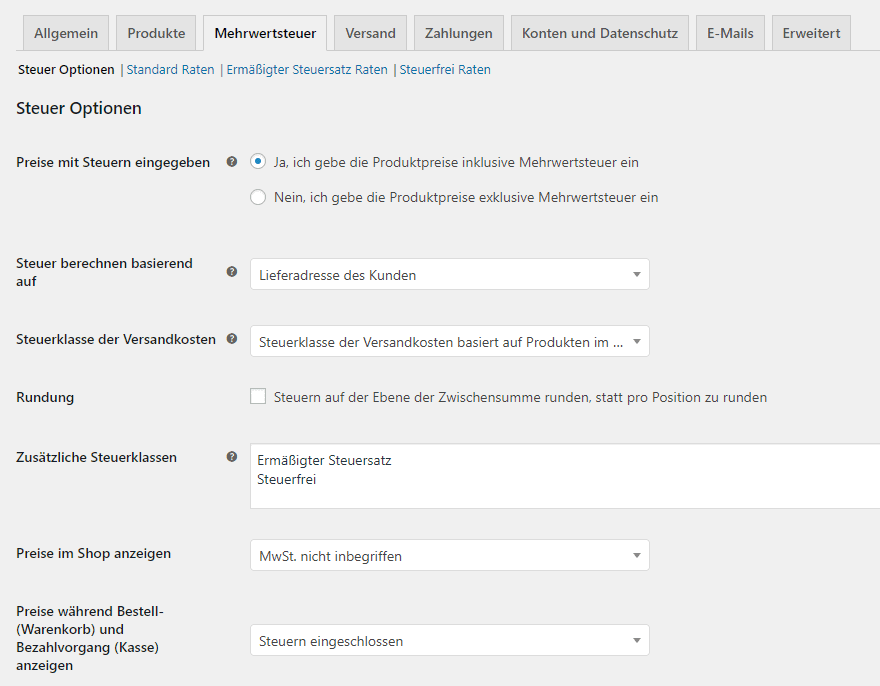
My recommendation: set up one or more of your own WooCommerce shops first, regardless of whether they're just demos or you actually end up selling the products. The best way to get to know WooCommerce's features is to try them out. You won't be able to develop any plugins or themes for the shop system unless you know about the underlying processes.
Our tools for freelancers and agencies help you keep track of your development. Among other things, with an easy-to-use staging environment, backups without pluginand free WooCommerce hosting.
The next step: Take over the maintenance of a smaller WooCommerce Shop, including adding new products. This way you can quickly learn more about related functions like order processing, shipping, payment, and the checkout.
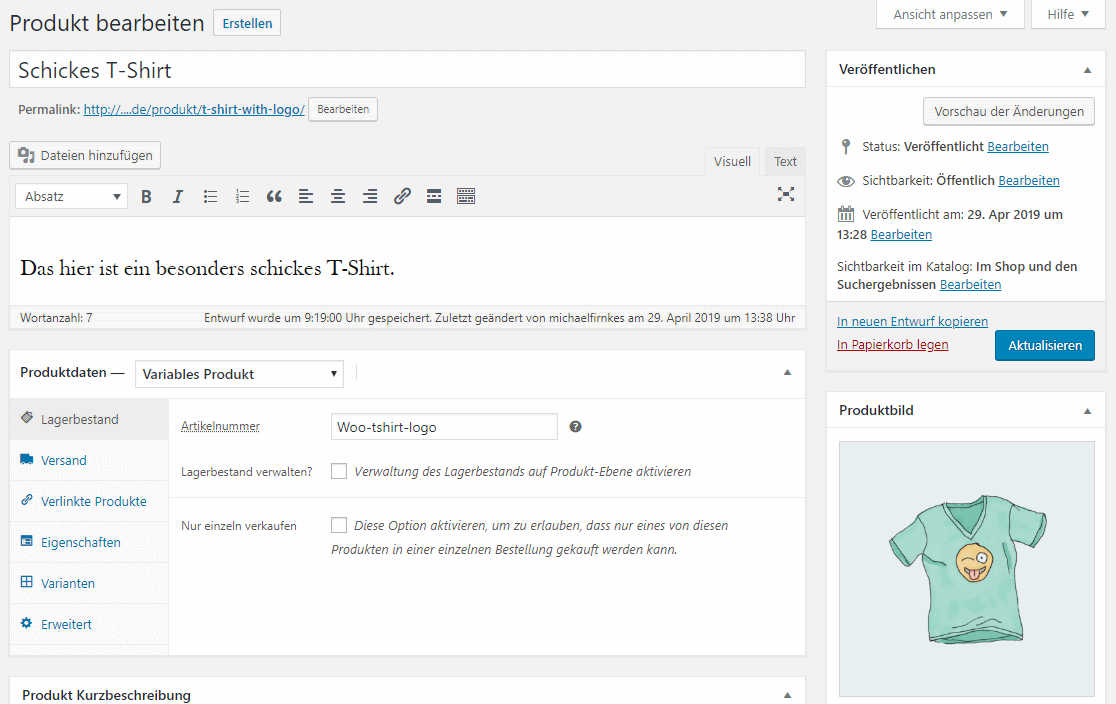
Whichever way you choose to go, you should find out where your strengths lie in WooCommerce and WordPress. Are you the classic administrator? Do you prefer to develop? Do you love web design? Or do you see yourself in the planning role of project management? There is often very little overlap between these roles in the world of webshops as they quickly become very complex. In eCommerce, experts are more in demand than generalists. Your customers will quickly notice whether you put your heart and soul into the job or not.
Requirements for service providers
The running of an online shop requires not only technical expertise but also know-how in the following areas:
- Online and tax laws
- Logistics and accounting
- Usability and web design
- Online and content marketing, search engine optimization (SEO), performance measurement via Google Analytics and similar tools
- Dissemination in social networks
Your customers will therefore confront you with all manner of questions. Think carefully in advance about which of the above packages you can provide yourself and which you'd honestly prefer to work together with other professionals on.
Below you'll find a list of areas you can work with WooCommerce in. If you're not a developer yourself but rather run an online shop, you can use the list to find out more about the quality of your service providers.
Maintenance of WooCommerce
Initially, most shop owners decide to maintain their webshop themselves. Any of the following situations can then quickly overwhelm shop owners:
- The online shop is run parallel to a retail shop, which demands the owner's full attention.
- They don't have the technical expertise, either in WordPress, WooCommerce or in general.
- The shop grows quickly, many goods have to be entered and updated at the same time, and the orders get out of hand (see our tips on high-performance WooCommerce hosting).
In all these cases, the operators are grateful for a service provider who takes over the administrative activities in whole or in part. In most cases, billing is based on time and effort, but a fixed monthly fee is also conceivable.
Billing on the clock is very convenient for your customers: High payments are only due when there is a lot of work to be done, which is ideally reflected in higher sales. With a flat rate, you as a service provider should specify in writing exactly which task packages are included and which are not.
Our tip: Don't take on an assignment without a written contract. Clarify important questions about the scope of your work, rights of use and liability. Your maintenance can lead to the failure of the shop without this being foreseeable - for example when updating WooCommerce or a central plugin. And that quickly becomes very expensive. Have every contract legally checked by a law firm.
Typical packages for content or technical maintenance include:
- The creation of products or the import of these from external databases, including quality control
- The optimization of product images for the online shop
- Select suitable plugins for new functions
- Carry out WordPress, WooCommerce, existing plugin and theme updates
- Review existing and new functions in current versions of WooCommerce and troubleshoot any incompatibilities
- Further development of the web design or the WooCommerce theme
- Continuous updates, restoring backups in case of error
With all these tasks, you will quickly be confronted with questions that go beyond technical issues. For example, about online law ("Is the proposed plugin GDPR compliant?", "What exactly does the product page need to look like to avoid warnings?") or search engine optimization. Either you educate yourself here, or you work together with suitable experts. Here, too, clarify the question of who is liable for what in which case.
Plugin development
You do need some experience to develop plugins for WordPress. Even more experience is needed to develop plugins for WooCommerce as these small tools quickly dig deep into the logic of the shop system. One faulty line of code and the checkout can stop working as it should. Or even worse, fees and taxes might not be calculated properly. If such errors are only discovered after some time has passed, which has certainly occurred in practice, shop owners are left with a lot of work on their hands correcting the fallout.
Depending on the solutions you're planning to offer, WooCommerce developers need to have a deeper understanding of areas such as accounting, tax law, or logistics. Your customers rightly expect your product to be not only technically perfect but also perfect in terms of content. If you're really not interested in the world of eCommerce, you should better look for another field to concentrate on.
What are the opportunities for WooCommerce plugins? The opportunities for WooCommerce plugins are promising. Depending on the area of application, the market may not be as large as it is for WordPress plugins but you can count on the following advantages:
- WooCommerce plugins can usually be sold at higher prices than WordPress plugins.
- Shop owners earn money with their portals. That's why they're prepared to invest more. In general, the share of professional operators is significantly higher than in the classic blogger environment.
- Shop operators often have no technical expertise. This means that they need tools even for manageable use cases and won't be developing them themselves.
- Security and stability are particularly important to webshop operators. For this reason, license agreements often remain in place for many years.
For example, search wordpress.org for plug-ins for WooCommerce. From the download figures, you can quickly see which topics are particularly popular with users. At the same time, read the relevant support forums carefully. This way you can see how complex the queries are depending on the topic - and how much work you would have to do. This information must flow into your overall calculation and pricing.
Tools with added value or a unique selling proposition are typically found in the following areas:
- The connection to payment or logistics service providers that operate in a local market where they have high or growing visitor numbers
- Interfaces to systems such as accounting, merchandise management, analytics or CRM
- Extensions to new legal bases such as the General Data Protection Regulation (GDPR ), which is particularly important for webshops.
- Functions that are only required in certain target countries
- Advanced marketing tools from the areas of newsletters, cross-selling, or SEO for WooCommerce
Finally, see which tools have a Pro version. Because users are not willing to pay money for every application. This way you can roughly calculate the market chances for your Plugin idea. It also does no harm to have the roadmap of WooCommerce on your screen:
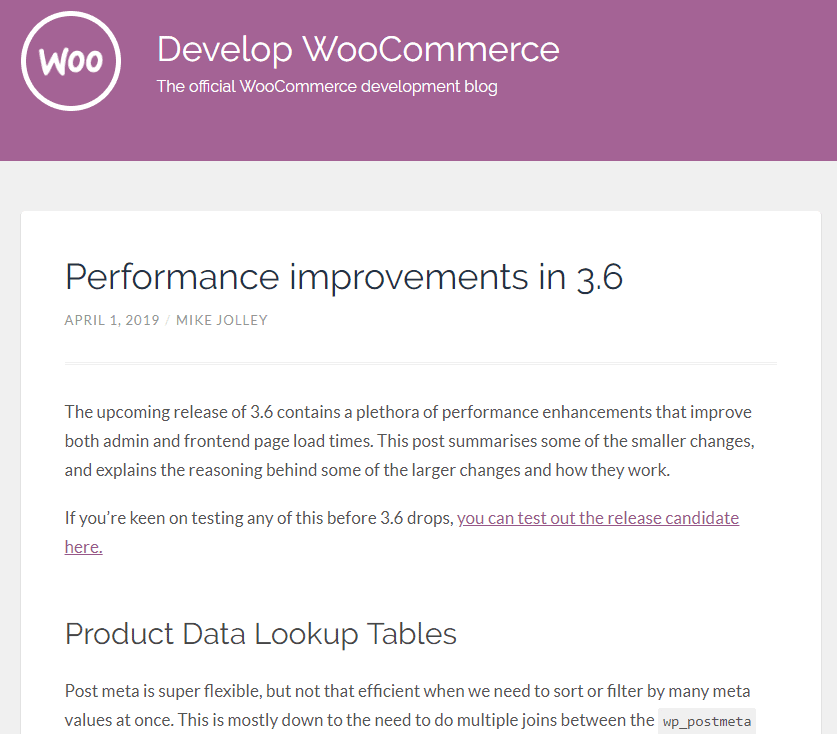
What's the point in developing a plugin whose functionality will just end up in the core of the shop system a little later on? Unless, of course, you're developing the plugin further for a specific submarket.
Theme development
The same applies here as with the Plugins. You will hardly succeed in launching a WooCommerce-Theme that will become very popular. It can be more effective if you move into niches. For example, with a mainTheme and associated childThemes for individual markets (one for grocery stores, one for online pharmacies, one for craftsmen, etc.).
However, research in advance how big the market in question even is. An example: If online pharmacies are heavily regulated in your country, it doesn't make sense to offer products for this target group. Portals such as ThemeForest .net are good for finding out general sales figures for individual sectors. Using the support questions, you can also research the countries from which the users mainly come.
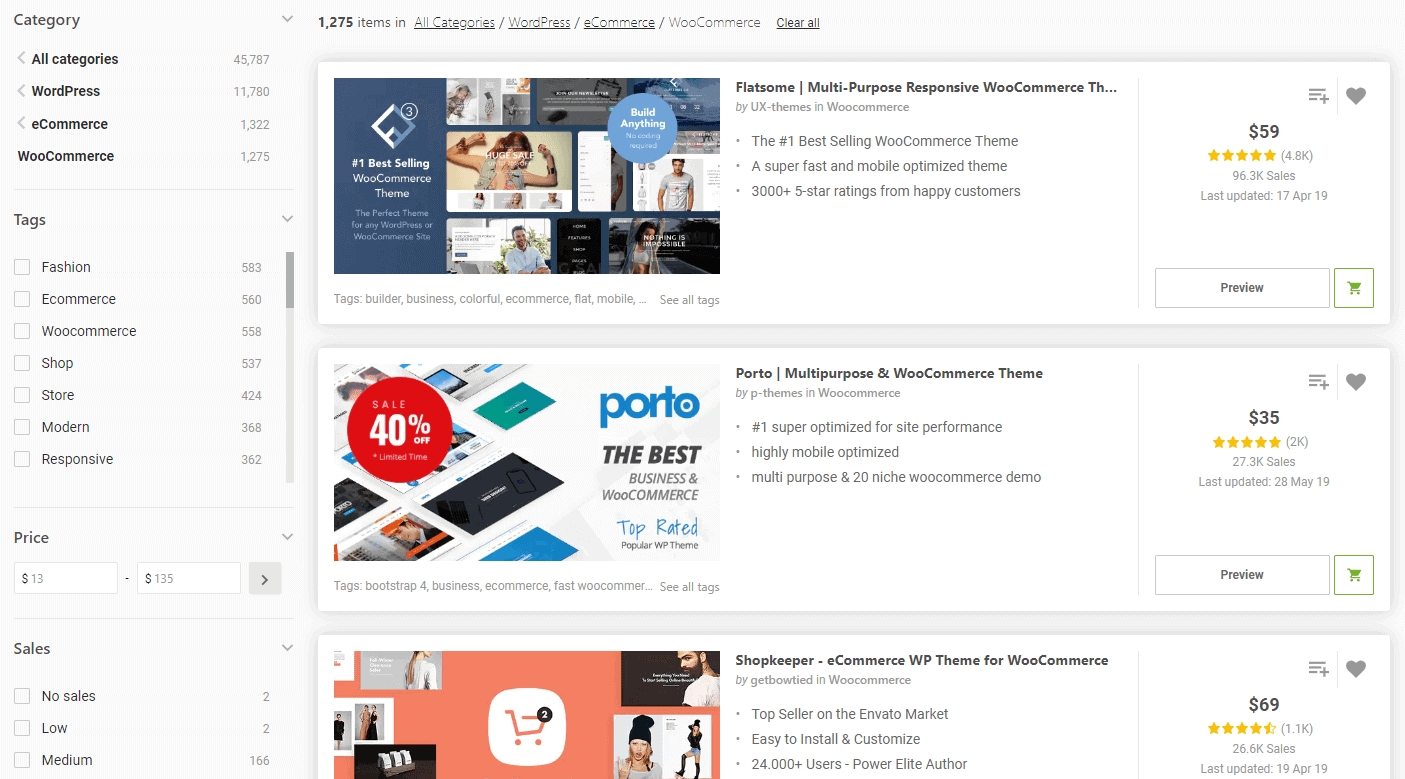
In practice, the following aspects have proven successful:
- Offer themes that are entirely created for WooCommerce. Allrounder templates usually fare worse.
- Find out which services WooCommerce doesn't offer in the standard system so that your theme can pick these up. For example, special subpages for artists' and creatives' showcases.
- Test target groups or markets that don't belong to the classic idea of a shop, but which nevertheless sell products and services with WooCommerce. The competition here may be less intense. This could include, among others, event agencies, trainers, market and trading places, or subscription models.
- Place special emphasis on a user-friendly design of the product pages and on the topic of performance. Many classic shopThemes do not really perform well here.
- Put extra effort into your theme documentation. It's your poster child and says a lot about the quality of your work.
In general, your theme needs as many unique selling propositions as possible while targeting as wide a market as possible. This will make marketing much easier for you.
Note: You should create your own portal where you market your products - whether you are developing Plugins or Themes . However, it takes time until your customers know about it. Especially in the beginning you can use additional marketplaces like ThemeForest or codecanyon.net for distribution.
Online marketing for WooCommerce
Webshops partly need other online marketing measures than classic portals. This starts with the SEO optimization of product pages and ends with services such as Google or Facebook shopping. Search engines, for example, usually have special rules for the listing of web shops. Subscribe to Google's Webmaster Central blog for this. It gives you first-hand tips on what is important when optimizing websites and shops:
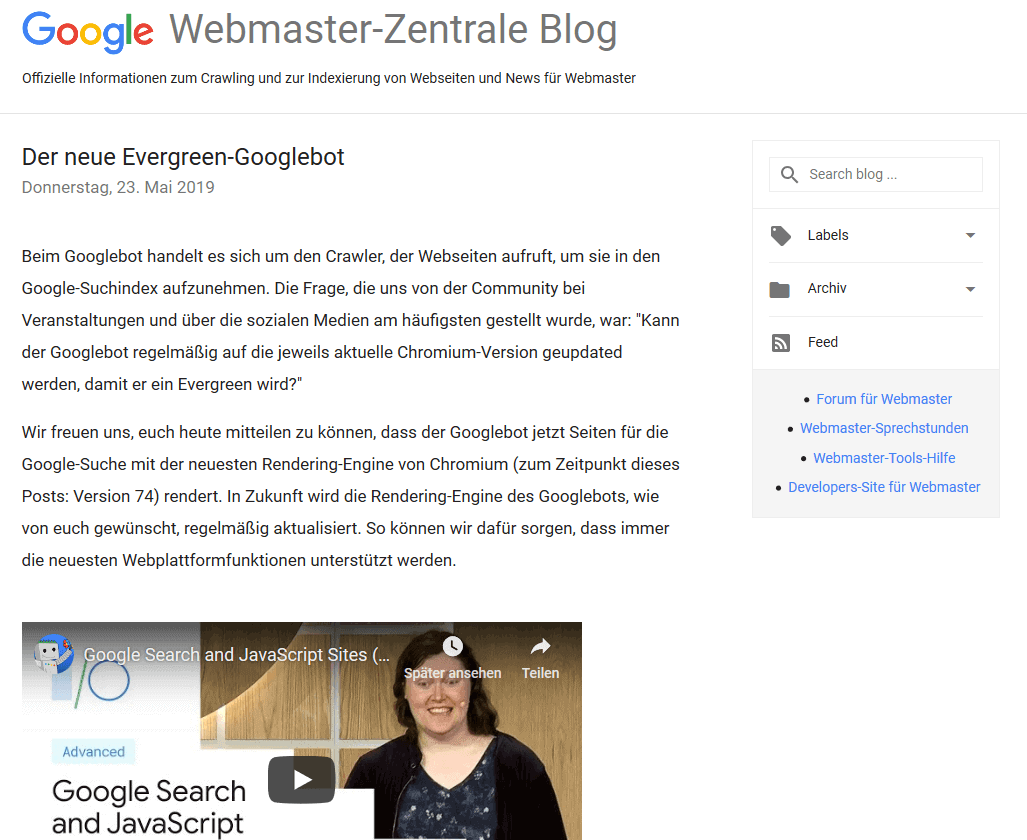
WooCommerce SEO is still a small niche but that could change as the shop system grows in popularity. In addition, there are countless small webshops that are only gradually becoming more professional. These have not yet recognized the need for optimization. But with increasing shop competition such optimization will be unavoidable.
An online marketing package for WooCommerce could include classic SEO measures, such as:
- Optimization of product and category pages
- Development of a target-oriented category and keyword structure
- Avoidance of duplicate content
- Correct technical division of multilingual shops
- Increase loading speed etc.
But this also includes the quite complex setup and maintenance of associated SEO-Plugins for WordPress and WooCommerce, for example Yoast WooCommerce SEO. See also our e-book on Page Speed & Performance. There you will learn which optimization measures ensure a faster WooCommerce shop.
Takeover of complete shop projects
You can, of course, also offer all the services described above in one. Your main target groups are then:
- Companies that focus on sales but not on technical operations
- Classic shops that want to generate additional sales but don't necessarily have the required expertise or time to do so
- Classic portals that are already working with WordPress and need an additional sales channel (e.g. for e-books or webinars)
To be fair, however, you'd only offer such complete packages as an agency and not as a lone wolf. And only if you have employees specialized in web design, development, analytics, performance, SEO etc. in your team.
As already mentioned, the individual disciplines have become so complex that it's impossible for one person to have all these skills. Many companies have had bad experiences with agencies in the past. Mainly because agencies have been known to promise things they can't ultimately deliver. Experienced customers would rather you say what your strengths are and call in other specialists for everything else.
Generally speaking, the start will be a lot easier for you if you connect early on with other freelancers or agencies operating within the WordPress and WooCommerce fields.
Note
Important sources and WooCommerce Community
Up to now, people interested in WooCommerce have organized themselves in the WordPress community. The main places to go are the larger WordCamps and local user meetings called WP Meetups. Many of these meetings are published on meetup.com - there you can search for suitable events in your region. One place to go for German-speaking meetups is wpmeetups.de:
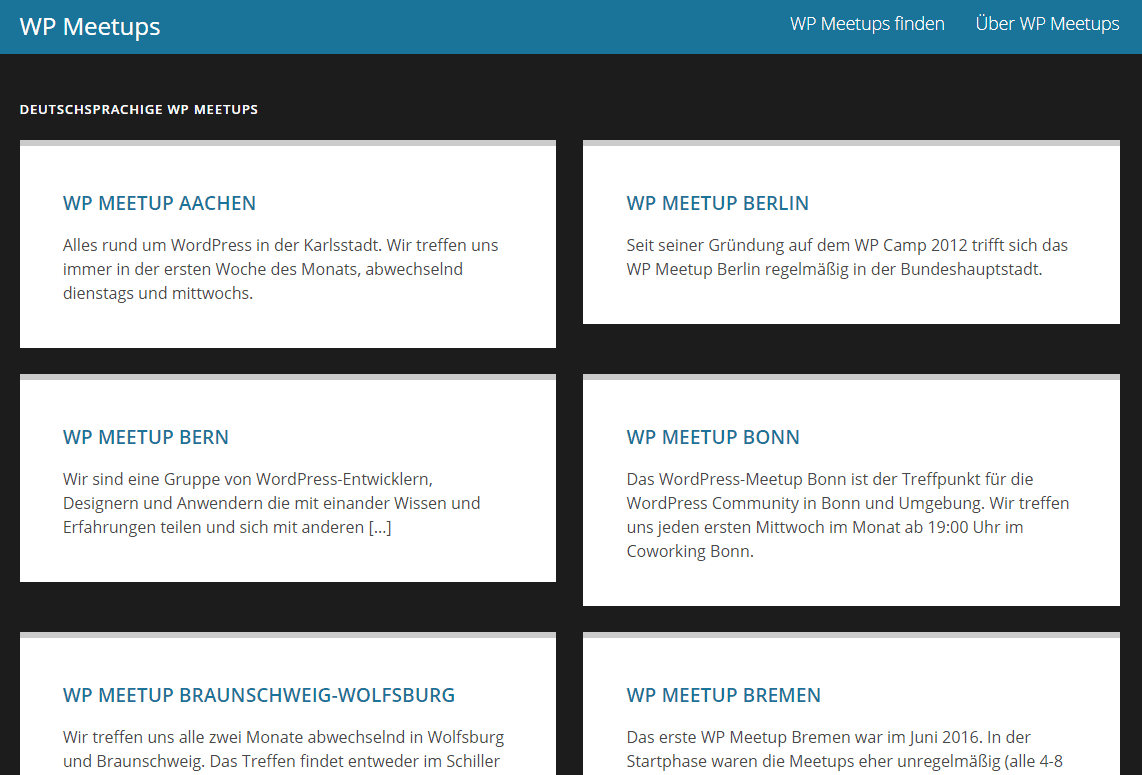
Meanwhile, the first meetings purely for WooCommerce are advertised. See the corresponding section on woocommerce.com.
In the following you will find the most important sources around the leading shop system - divided into international sites as well as references for the German-speaking market. You can also subscribe to our blog. In it, we regularly report on all innovations for WooCommerce. Follow us on Twitter, Facebook or via our newsletter.
Portals and forums
Official sites from WooCommerce
- Official WooCommerce website
- Plugin page on wordpress.org
- Extensions for WooCommerce
- WooCommerce Developer blog
- WooCommerce User blog
- Documentation
- Developer Documentation/API
- WooCommerce Support forum
- Premium support
- Slack community
Other sources
- Documentation "Getting Started"
- Video tutorials "How to build a WooCommerce store"
- WooCommerce Tutorials on YouTube
- Posts on WordPress .tv
- WooCommerce Podcast by BobWP
- WooCommerce Plugins at wordpress.org
- GitHub repository
- Free WooCommerce Themes
- Facebook group for beginners
- Facebook group for professionals
Portals and forums for Europe
- Our blog articles
- our newsletter now
- "WooCommerce set up" series of posts by MarketPress
- Tutorials from WooExpert
- Link list to WooCommerce from MarketPress
- WooCommerce hosting
- WooCommerce Specialist group on Facebook
- WooCommerce-Forum on wpde.org
You can find more tips on WooCommerce in our 70+ sites strong e-book WooCommerce for professionals: Online shops with WordPress . It is aimed at freelancers, agencies, WP professionals, but also at beginners.
We look forward to meeting you at a WordCamp - Raidboxes regularly sponsors camps and meetups in German-speaking countries. You have further questions about WooCommerce? Then feel free to use the comment function.
I wish you the best of luck with your WooShops!
Contributed image: Marvin Meyer @Unsplash
